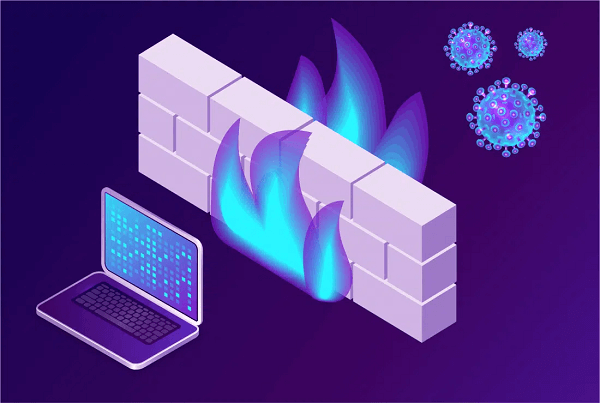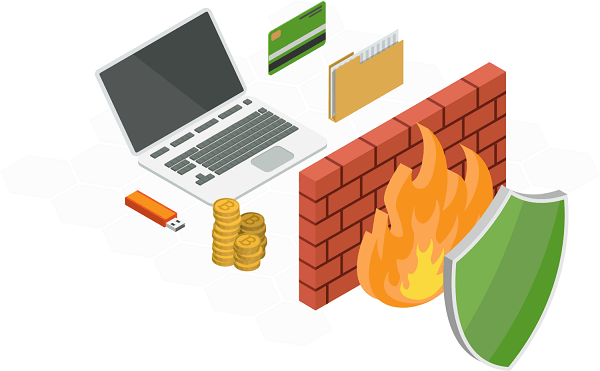Firewall DefinitionIt is a network security software or device that restricts internet traffic from, into, or within the private network. This dedicated hardware or software unit operates by blocking particular or allowing certain data pockets. The main objective of this device or software is to stop malicious operations and to check unauthorized access, and it permits authorized traffic to pass through it. Firewalls can be installed using hardware appliances, software applications, or both. Firewalls play a crucial role in the prevention of future cyberattacks and in securing networks. 
A firewall forms a "choke point" to conduit web traffic at which they check set coded parameters and execute on that basis. Some firewalls also trace connections and traffic in audit logs to check what has been allowed or restricted. These network security firewalls are designed for web traffic management with the prime objective of the reduce the expansion of web threats. How Does a Firewall Function?
Benefits of Firewalls
Firewalls are a crucial component of modern-day cyber security problems. Firewall offers modern-day cybersecurity strategies and numerous programs to protect your system and network from illegitimate access, breach of data, and other cyber challenges. Some of the important benefits of firewalls include the following:
Top 10 Firewall Companies
Some of the top firewall companies present are:
1. Sophos FirewallIt is British-based security software and hardware company. It was established in 1985 by the founder's Peter Lammer and Jan Hruska. It has specialization in developing products such as unified threat management, communication endpoint, network security, mobile security, email security, and encryption. 2. Check Point Next Generation Firewalls (NGFW)Next-level sophisticated network security appliances offer elaborate protection against several cyber threats, such as advanced persistent threats (APT), ransomware, malware, and other virus attacks. It is a high-profile cybersecurity company that provides high-quality and diverse security solutions, and NGFWS is a key element of its security portfolio. Check Point Next Generation Firewalls are configured to multiple layers of security to guard the network and data from possible cyberattacks. 3. FortiNetIt is a well-known and most-used network solution that offers protection against several cyber attacks assisting institutions to guard their data and servers against potential cyberattacks and security lapses. A cybersecurity company called Fortinet has developed the system. They are constructed in such a way as to provide elaborate network security, such as anti-virus, web filtering, a virtual private network (VPN), an intrusion prevention system (IPS), and other security mechanisms. Institutions and organizations of varied sizes, from small firms to big business houses, use this application to guard their networks against cyberattacks, such as malware, viruses, hackers, and other malicious activities.
FortiGate appliances offer impeccable performance and scalability, the ability to administer voluminous traffic with low latency. It also offers centralized management and reporting enabling network users to manage, design and monitor multiple FortiGate devices from a single console. 4. Watch Guard Network SecurityIt is a cybersecurity company offering diverse network security solutions such as cloud-based security, firewalls, etc. Watch-Guard is a crucial component of network security solutions and offers elaborate security features such as web filtering, anti-virus, intrusion prevention, VPN, Firewall, etc. It is constructed to eliminate cyber threats such as hackers, malware, malicious activities, and viruses. It also provides secure Wi-Fi access points framed to give secure and reliable wireless connectivity while maintaining robust security standards. These access points include rogue access point detection, wireless intrusion prevention, and application-level control to protect against wireless threats. WatchGuard is used in diverse sectors such as retail, finance, healthcare, education, etc. This appliance also suits small firms to large firms. Their application is immensely popular for enhancing reporting capabilities, centralized administration, ease of use, and enabling network users to vigil and control the security infrastructure grid from the single console. WatchGuard Technologies, Inc has developed this security solution.
5. Pf sensepfSense is an open-source network security software. It is a free and open-source Unix-like operating system. It is programmed to operate like a firewall, UTM (Unified Threat Management) platform, and router. The features provided pfSense include stateful packet filtering, an intrusion detection and prevention system, a virtual private network (VPN), web filtering, load balancing, traffic shaping, and more. It is known for flexibility and extensibility and enables administrators to customize and configure their security grid depending on specific requests. The web-based Graphical user interface gives an easy-to-easy interface for administering and configuring several security schemes. It also endorses a large number of add-on packages that can be instituted to boost its functionality; for example,
Due to this pfSense becomes a customizable and versatile network security solution that can be molded to meet the unique requirements of diverse conditions. One of the recognized features of the pfSense is strong community support. Since it is open source, it received feedback from a large and active community of developers and network administrators who assist in developing and continuously improving its features and performance. Additional features include advanced logging and reporting features, enabling network users to monitor and analyze network traffic, trace security events, and produce reports for compliance and auditing purposes.
6. Sonic Wall
It is an American Cybersecurity firm that offers several internal products primarily related to network security and content control. SonicWall provides firewall appliances, endpoint security, secure remote access solutions, wireless security, email security, and more. It also protects the networks from outside attacks such as viruses, ransomware, malware, and other cyberattacks.
7. Zscaler Internet AccessIt is a cloud service company based in the United States. It offers secure and policy-based access to the Internet. Some of the essential features of the software include:
Zscaler Internet Access uses several authentication methods such as multifactor authentication (MFA), single-sign-on, Integration, and identity providers such as active directory and other SAML-based IDPS. It makes sure that only authorized users have access to the Internet
8. Huwaei FirewallIt is a multinational technology company based in China. It manufactures, designs, and sells smart devices, consumer electronics, telecommunication equipment, and other solar rooftop products.
Huawei offers various services and products, including cybersecurity solutions and networking. The firewall products of Huawei contain a virtual private network, advanced threat intelligence, application control, intrusion and detection prevention system, and stateful packet inspection. Huawei products are typically used in cloud environments, data centers, and enterprise networks. They are formed to provide a robust security network to prevent cyber-attacks and protect critical assets.
Next TopicFlash Point Definition
|
 For Videos Join Our Youtube Channel: Join Now
For Videos Join Our Youtube Channel: Join Now
Feedback
- Send your Feedback to [email protected]
Help Others, Please Share










